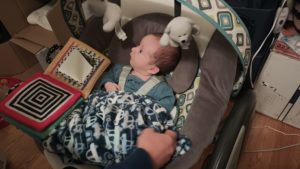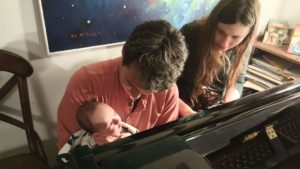We’re a week into 30 Poems in November, and I have eight poems. The days leading up to this practice (as I wrote about last week) always feel like the hardest, especially in those moments before I squeeze out the first poem and realize, hey, it isn’t so bad. I can do this. And suddenly something shifts. I enter November, a month that’s always been a downer for me due to the sudden onslaught of afternoon darkness, in a new state of mindfulness that starts to mitigate the pressure to produce. I can’t explain exactly what that is, but the practice of capturing something in a poem every day puts me in a headier zone, and I start to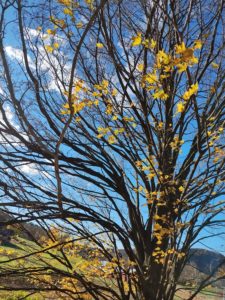 look at things differently. Even today, when I sat down to try to write Poem #9 and came up empty (so I started to write this blog post instead), I found myself intrigued by the leaves’ dance outside my window in that brilliant, but all-too-fleeting sun.
look at things differently. Even today, when I sat down to try to write Poem #9 and came up empty (so I started to write this blog post instead), I found myself intrigued by the leaves’ dance outside my window in that brilliant, but all-too-fleeting sun.
Knowing that I’m impacted by Seasonal Affective Disorder raises the stakes on my personal to-do list. Not only do I have to write 30 poems in November, I have to get outside every day, targeting the time when the sun is at its strongest. This puts a crimp in my writing schedule since the morning light is the best. There’s nothing more demoralizing than watching the sun beginning to sink over horizon at 2 o’clock in the afternoon. But morning is also when my writing brain is at its best, so something has to give.
Still, outdoors is a great place to be mindful. When I’m out with my 13-month old grandchild, I try to tune in to what he might be noticing: the birds tweeting, the random ding dong of the wind-chimes, the thrill of a spread of cool garden rocks to sift through, and hold, and fling down, listening to the satisfying clink. These were some of the images that made it into my poem yesterday.
And even though I strongly recommend it, you don’t really need to go outside if that doesn’t call to you. Today, one of the prompts I received in my Zoom writing group was to use found words to create a poem. Simply open up a book and circle random words, or pick a passage and erase sections of it, creating a poem out of what’s left. Or, make a poem out of random newspaper headlines (if you can stand writing something that’s likely to be depressing). Or, as I started to do, list what you notice about your surroundings. My cat, who has taken over my yoga mat, is SO content basking in the sun. And those fuzzy empty slippers by the porch door sure look cozy.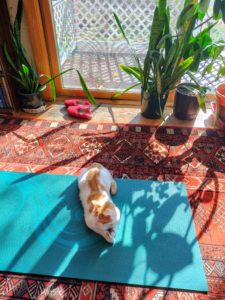
I didn’t end up using these images this time, but I did write a found poem from a cookbook I have called Flavors of Jerusalem, which helped me process a lot of the difficult feelings I’ve had about the conflict without the need to be didactic or even mention the war. Metaphors are great in that way. I’d much rather write about cumin and paprika than airstrikes. And mindfulness is a way of thinking about what these spices evoke, and tuning in to which images: spices, cats, slippers, or whatnot, you might need to enhance the flavor of your writing.

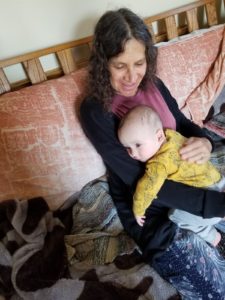
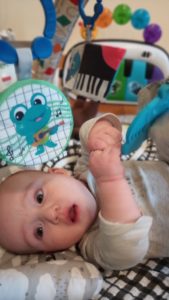 In fact,
In fact, 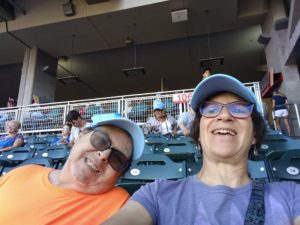 “An artist needs to be something like a whale swimming with his mouth wide open, absorbing everything until he has what he really needs.”–Romare Beardon
“An artist needs to be something like a whale swimming with his mouth wide open, absorbing everything until he has what he really needs.”–Romare Beardon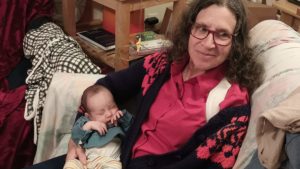 Both have inspired a lot of writing, and watching the awe and wonder with which Manu approaches the world fills me with a poignancy hard to describe without resorting to clichés about both the preciousness and fragility of life, and how one of the most healing things we can do for grief (at least for me) is to continue to practice gratitude and look forward, even as we continue to struggle to make sense of the cracks in our past.
Both have inspired a lot of writing, and watching the awe and wonder with which Manu approaches the world fills me with a poignancy hard to describe without resorting to clichés about both the preciousness and fragility of life, and how one of the most healing things we can do for grief (at least for me) is to continue to practice gratitude and look forward, even as we continue to struggle to make sense of the cracks in our past.